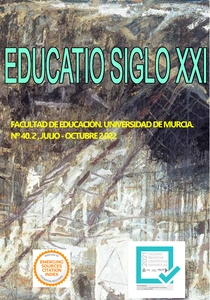Learning to teach in a consecutive modality teacher: learning - passage /s
Abstract
This article, part of a doctoral thesis, explores the specificities of learning in relation to teaching that is achieved within the framework of a teaching career of consecutive modality or of curricular complementation. This modality targets university graduates who decide to work in teaching. We used a qualitative methodological design aimed at exploring the ways in which individuals in this situation perceive and experience the phenomenon, their points of view, interpretations and meanings. More specifically, we focused on the moment when these teachers initiate their teaching. According to the results of the thesis, the learning achieved is characterized as passage / s. Two types of passages were identified: those related to roles or institutional positions - from students to teachers - and those related to profession and work objects - from specialists in a disciplinary field to educators. Participants highlight teaching itself and the help of other colleagues as the main sources of learning. The results contribute to problematizing teacher training in its initial stage, especially around its didactic aspects. They also highlight the importance of teaching practice in the teacher training curriculum, on the one hand, the centrality of practices in teacher training curricula and the ways teacher trainers teach.
Downloads
-
Abstract851
-
PDF (Español (España))375
References
Bibbó, M. y Labeur, P. (2012) Escribir la metamorfosis: saberes disciplinares y escritura en el pasaje de alumno a profesor de letras. En Bombini, G. (Ed.) Escribir la metamorfosis. Escritura y formación docente (pp. 67-98) Buenos Aires: Ediciones El Hacedor.
Davini, C. (1995) La formación docente en cuestión: política y pedagogía. Buenos Aires: Paidós.
Derrida, J (2008). La Hospitalidad. Buenos Aires: Ediciones de la Flor.
Esteve J. M. (2009). La profesión docente ante los desafíos de la sociedad del conocimiento. En Vélaz de Medrano, C. y Vaillant, D. (Coords.), Aprendizaje y desarrollo profesional docente (pp.17-28) Madrid: Fundación Santillana, OEI.
Flick, U. (2004) Introducción a la Investigación Cualitativa. Madrid: Morata.
Greco, B. (2007) La autoridad (pedagógica) en cuestión. Una crítica al concepto de autoridad en tiempos de transformación. Rosario: Homo Sapiens.
Greene, M. (2009). El profesor como extranjero. En Larrosa, J. et al. Déjame que te cuente (pp. 81-130). Barcelona: Laertes.
Hernández Sampieri, R. (2014) Metodología de la investigación. México: Mc.Graw Hill Education.
Jáuregui, J. (2002). La teoría de los ritos de paso en la actualidad. Antropología. Revista Interdisciplinaria Del INAH, Núm. 68 pp. 61-95. https://www.revistas.inah.gob.mx/index.php/antropologia/article/view/4971.
Jost, F. (2012). ¿Qué significa hablar de “realidad” para televisión? Toma Uno 1(1), pp.115-128. https://revistas.unc.edu.ar/index.php/toma1/article/view/8574
Larrosa, J. (2009) Experiencia y alteridad en educación. En Skliar, C. y Larrosa, J. (Ed.) Experiencia y alteridad en educación (pp. 13-44). Rosario: Homo Sapiens.
Marcelo, C. (2009) Formalidad e informalidad en el proceso de aprender a enseñar. Revista de Educación, num.350, pp.31-55.
Martinand, J. L. (1994). La didáctica de las ciencias y la tecnología y la formación de profesores. Revista Investigación en la escuela. (Núm, 24, pp. 59-69).
Nóvoa, A. (2009). Para una formación de profesores construida dentro de la profesión. Revista de Educación (Núm. 350 pp. 203-218).
Putman, R. y Borko, H. (2000). El aprendizaje del profesor: implicaciones de las nuevas perspectivas de la cognición. En Biddle, B., Good, T. y Goodson, I. (Ed.) La enseñanza y los profesores I. La profesión de enseñar. (pp. 219-309). Barcelona: Paidós.
Shulman, L. (2005) Conocimiento y enseñanza: fundamentos de la nueva reforma. Revista de currículum y formación del profesorado, 9, 2 pp 1-30. http://www.ugr.es/local/recfpro/Rev92ART1.pdf.
Vaillant, D. (2009). Formación de profesores de Educación Secundaria: realidades y discursos. Revista de Educación, (num.350, pp. 105-122).
Van Gennep, A. (2008) Los ritos de paso. Madrid: Alianza Editorial.
Copyright (c) 2022 Servicio de Publicaciones de la Universidad de Murcia

This work is licensed under a Creative Commons Attribution-NonCommercial-NoDerivatives 4.0 International License.
Original work publishes in this journal is subject to the following terms:
1. Murcia University Press (the publishing house) holds the copyright of the publishes work, and favours and allows their reutilization under the use license stated in point 2.
© Servicio de Publicaciones, Universidad de Murcia, 2015
2. Work is published in the electronic edition under a license (Creative Commons Reconocimiento-NoComercial-SinObraDerivada 4.0 España (legal text). They can be copied, used, disseminated, transmitted and publicly presented, as long as: i) authorship and original publication source is acknowledged (journal, publishing house and URL of the work); ii) are not used for commercial purposes; iii) the existence and specifications of this use license is stated.
3. Conditions for self-archive. Authors are allowed and encouraged to disseminate electronically the pre-pint (before review) and/or post-print (accepted for publication) versions of their work before their publication since that favours earlier circulation and dissemination resulting in an increased chance for the authors to be cited and for the work to reach a bigger share of the academic community. Colour: RoMEO: green.








